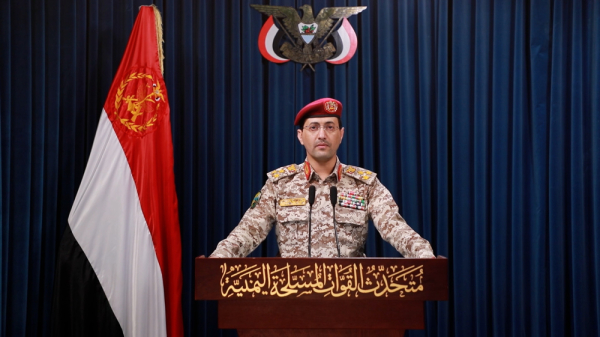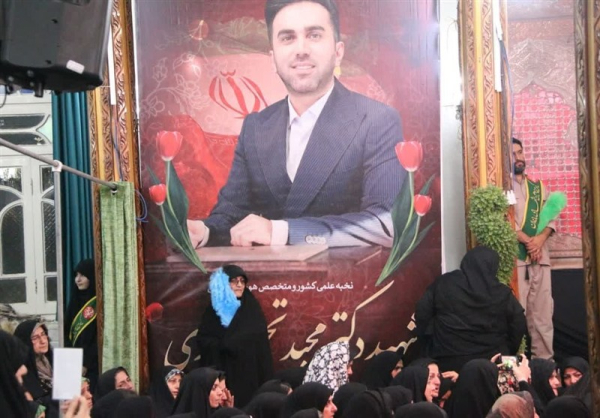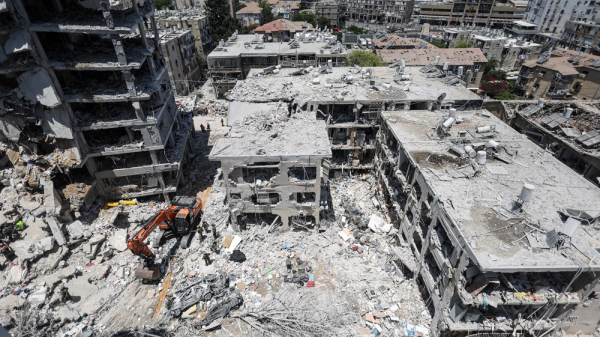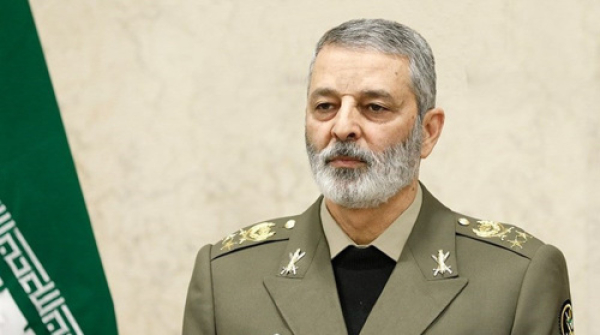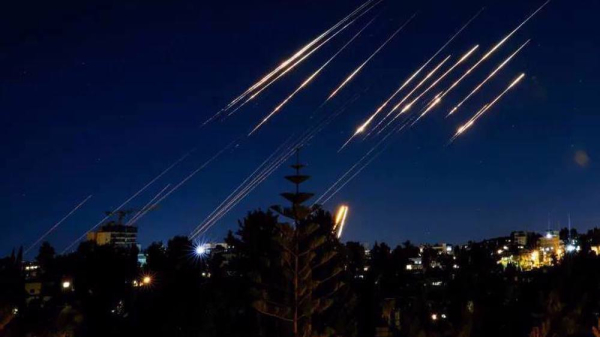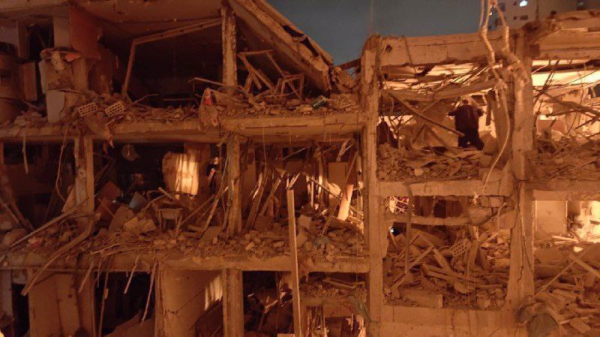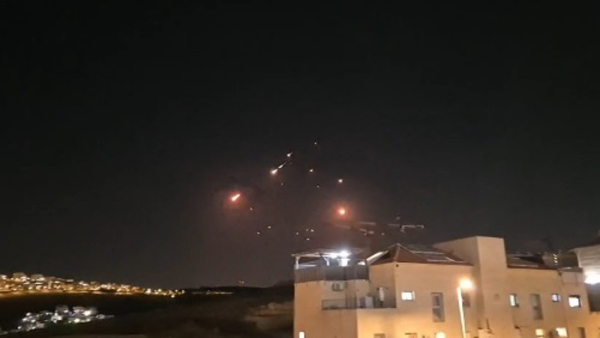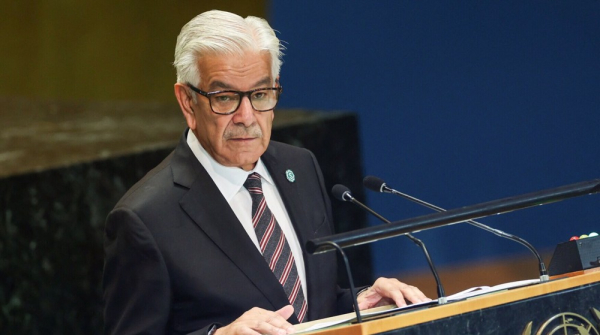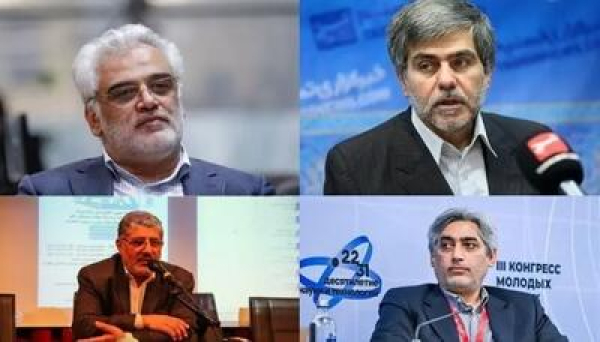zarezadeh
Yemen sinks another Israel-bound ship violating ban in Red Sea
Yemen has attacked another Israel-bound ship in support of Palestinians facing genocide in the Gaza Strip.
In a statement on Wednesday, the Yemeni armed forces announced that its navy “targeted the ship ‘ETERNITY C’, which was heading to the port of Umm al-Rashrash (Eilat) in Occupied Palestine”, after its crew ignored warnings and calls issued by the naval forces.
According to the statement, the military operation was carried out with “an unmanned surface vehicle and six cruise and ballistic missiles.”
Noting that the vessel “completely sank”, the statement said the operation was “documented with audio and video.”
The crew was, however, “rescued” and “transported to a safe place” by the Yemeni forces, the statement said.
The armed forces noted that the attack came as the vessel and its shipowner “resumed operations with the port of Umm al-Rashrash in clear violation” of the ban imposed by Sana’a on ships linked to Israel.
The statement stressed that the ban imposed on ships linked to Israel in the Red and Arabian seas is still in place, warning companies against engaging in transactions or activities involving Israeli ports.
“Out of concern for the safety of ships and their crews, we reiterate our warning to companies and countries about the consequences of dealing with the Zionist entity and sending their ships to the ports in Occupied Palestine.”
The statement stated that the Yemeni retaliatory operations will continue until “the aggression on Gaza stops and the siege imposed on it is lifted.”
Earlier this week, the Yemeni armed forces released footage of the boarding and sinking of the ship Magic Seas, whose owning company violated the Yemeni ban on Israel-bound vessels.
Since the onset of the genocide in October 2023, Yemeni forces have carried out scores of operations in support of the war-hit Gazans, striking targets throughout the occupied Palestinian territories, in addition to targeting Israeli ships or vessels heading towards ports in the territories.
The regime launched the war after Gaza's resistance fighters waged the surprise Operation Al-Aqsa Storm against the Zionist entity in response to the regime's decades-long campaign of bloodletting and devastation against Palestinians.
The regime’s bloody onslaught on Gaza has so far killed at least 57,680 Palestinians, mostly women and children.
Press TV’s website
Science as a threat: Why Israel assassinated two of Iran’s brightest AI trailblazers
By Humaira Ahad
In a quiet neighbourhood of northeastern Tehran, the aftermath of Israel’s terrorist aggression on June 13, 2025, still lingers in the air, and the scars are still fresh.
On that day, in a brazen act of aggression, the regime warplanes bombed a residential block, killing dozens of civilians. Among the martyrs were two of Iran’s young and brightest minds.
Dr. Majid TajenJari, a globally recognised expert in artificial intelligence, and Dr. Mohammad Reza Zakarian, a gifted AI pioneer, were the targets of the bombing, which also killed many women and children who were trapped under the rubble for days.
The two young men represented a new generation of Iranian scientists committed to advancing their country through knowledge and innovation.
Despite lucrative opportunities abroad, they chose to remain in Iran, investing their talents at home. They were killed in their own homes, alongside their families.
A life of purpose
A day after the bombing leveled one side of the apartment building, Zakarian’s father was searching through the rubble for any signs of his grandchildren.
Fatemeh, who would most of the time cling to her grandfather, was five, and Zahra was just seven months old. Stunned and distraught, he wandered among the ruins of the destroyed building, whispering to himself:
“Are you so vile that my child was a thorn in your eye? Shame on you. What did you want with his wife and children? What wrong had their neighbours done?”
Born into a family deeply rooted in values of integrity and patriotism, Zakarian showed early signs of brilliance. He distinguished himself through academic excellence and strong moral integrity.
The young Iranian scientist earned his bachelor's degree from Isfahan University of Technology and later a master’s degree from Malek Ashtar University, both institutions renowned for nurturing elite talent in science and technology.
His father, Mohammad Hossein Zakarian, described him as someone who consciously turned down multiple offers from foreign countries, including tempting scholarships and jobs. The young Iranian scientist had made his choice to stay in Iran and serve his country.
“The martyrs among the scientific elite, like my son, fulfilled their duty by remaining in Iran to promote the country’s progress and dedicate themselves to scientific work," he said.
"Despite receiving scholarship offers from numerous foreign countries, my son chose to stay and apply all his academic abilities to serve the advancement of his homeland."
His martyrdom was not, as his father explains, an accident of war, but an assassination – targeted, deliberate and brutal.
“I am honoured to have raised and presented to the country and nizaam (Islamic Republic) a son whose scientific expertise contributed significantly to the nation’s advancement,” the father of the martyred scholar expressed his pride.
“This regime showed no mercy, even to children, having martyred my two granddaughters, five-year-old Fatima and seven-month-old Zahra. Such a regime, responsible for these heinous acts, is destined to dig its own grave.”
The funeral for the family was held in Zakarian’s hometown of Amirkola, Babol, in northern Mazandaran province, where large crowds gathered, showing a broader sense of loss.
Many of the mourners had never met Zakarian, but saw in him a symbol of resistance of a nation that refuses to surrender its intellect, dignity, or future.
The man who promoted the AI renaissance
Dr. Majid TajenJari, 35, came from the serene village of Tajen Jar in Amol, also in the northern province of Mazandaran. He was a polymath and technological visionary.
His main focus was invention and education. As the head of the Artificial Intelligence Commission at the Youth Chamber of Commerce of Iran, he stood at the vanguard of Iran’s AI revolution.
TajenJari’s academic path was formidable. After completing his master’s thesis on fingerprint recognition using neural networks, he pursued a doctoral dissertation on developing a bilingual humanoid robot, one that could speak both Persian and English.
His studies combined software engineering with deep cultural sensitivity, aimed at advancing Iran in the field of humanised AI.
His career was marked by a series of significant scientific accomplishments. He earned gold medals in the 2012 and 2015 world invention competitions, a registered global patent in Russia (2009) and multiple awards from Switzerland, Croatia, Germany, Serbia, and Moscow.
But beyond the accolades, it was TajenJari’s commitment to education that defined him.
“His vision was clear,” said Dr. Mohammad Hadi Zahedi, Director General of the Statistics and IT Centre at the Ministry of Science.
“He believed that progress begins at the age of seven. That’s why he co-founded a groundbreaking educational centre to train children and teenagers in AI and Python programming.”
In just a few years, the centre sparked a wave of creativity across Iran’s youth.
“He didn’t believe in ivory tower science,” Zahedi added. “For him, research wasn’t enough unless it was implemented, unless it became a solution to a societal problem.”
The young Iranian scientist translated his research into noticeable results and implemented it within Iran’s industries and society.
TajenJari’s inventions in image processing for facial recognition, cargo container scanning, and steel quality analysis were being tested for industrial use.
“The martyr brought his knowledge into the field of practical application. One of his key priorities, alongside education, was to ensure this training was practical, not just theoretical. It was a kind of training where individuals were able to produce tangible results, products or services that could solve real challenges in society,” Zahedi said while explaining the scientific achievements of TajenJari.
Martyrdom deepens resolve
What linked the two men was not only their scientific expertise but also their role in a broader national project of technological independence. For years, the Zionist regime’s strategy has included efforts to hinder scientific and defence progress in different countries.
In Iran, that has meant targeting the infrastructure of self-reliance embodied by scientists like Zakarian and TajenJari. Targeted assassinations of Iranian scientists have been a recurring feature of Israel’s covert strategy to undermine the country’s technological progress. It is a part of a broader campaign that includes terrorist acts like sabotage, cyberterrorism, and airstrikes.
The two Iranian scientists represented a scientifically advanced and independent Iran, driven by homegrown expertise and national determination.
For their families, the loss is deeply personal, but so is the conviction behind their work.
“They think by killing our scientists, they can halt our progress,” said Zakarian’s father. “But others will rise. The path doesn’t end here.”
His words echo the broader current within Iranian society, where such terrorist attacks are met with a renewed sense of purpose. In intellectual circles and within families who have long carried the weight of sacrifice, there is a growing resolve to ensure that the expertise is passed on and expanded for the scientific sovereignty of the country.
Meanwhile, in Babol, Fatemeh and baby Zahra were laid to rest beside their parents, two children whose lives were cut short by a brutal Israeli strike on a civilian residential building.
The aggression, part of a long-standing strategy to eliminate the Islamic Republic’s scientific and technological advancement, has once again laid bare the Israeli regime’s deepening moral bankruptcy in targeting scholars, civilians, and children alike.
Iran has made clear that the country’s scientific trajectory will not be halted by cowardly assassinations but will only deepen the national resolve to make further advancements.
Press TV’s website
Allah wants Muslims to be strong and independent.
Allah says:
"and Allah will never provide the faithless any way [to prevail] over the faithful."
وَلَنْ يَجْعَلَ اللَّهُ لِلْكَافِرِينَ عَلَى الْمُؤْمِنِينَ سَبِيلًا(نسا ۱۴۱)
That is, infidels like the child-killing Zionist regime will not be able to overcome people of faith not only in terms of logic but also militarily, politically, culturally, economically, and in short, in any way.
And if we see their victory over Muslims in various fields with our own eyes, it is because many Muslims are not true believers, there is no mention of Islamic unity and brotherhood among them, nor do they have the necessary knowledge and awareness that Islam has deemed necessary for everyone from the moment of birth to the moment of death, and since they are like that, naturally they are like this?
Bat Yam city looks like Gaza after Iran’s missile strike against Israel: Hebrew media
The city of Bat Yam in the Israeli-occupied territories looks like the destroyed areas in the Gaza Strip in the aftermath of the retaliatory strikes that Iran carried out against the regime, according to Israeli Hebrew-language media.
The Israeli daily Calcalist reported that, according to new data, approximately 18,000 people have been evacuated from homes destroyed by Iran’s missile attacks.
Of these, 12,000 have been relocated to hotels while the remainder have been housed in rental apartments.
Analyses reveal that four cities—including Bat Yam, Tel Aviv, Rehovot, and Ramat Gan—were severely damaged by Iran’s missile attacks, while a critical shortage of available housing plagues displaced settlers.
Earlier, Bat Yam’s mayor, Tzvika Brot, disclosed the extensive damage resulting from Iran’s missile attacks on the city.
Speaking to Israeli Channel 10, Brot characterized the assault as “the harshest blow in the city’s history,” revealing that a 120-dunam (about 40-acre) residential area was entirely wiped out.
The mayor emphasized that the single-day Iranian bombardment produced destruction on an unprecedented scale, noting this now stands as the most catastrophic attack ever witnessed across the occupied lands, not just in Bat Yam.
Estimates suggest the destruction caused by Iran’s strikes will drive mid-term spikes in housing prices.
According to reports from real estate offices in northern Tel Aviv, there is insufficient apartment inventory in the area, leaving uncertainty over where displaced families will relocate.
The Israeli regime launched its unprovoked aggression on the Islamic Republic on June 13, with American backing, assassinating several top-ranking military commanders, scientists, and many other ordinary civilians, including women and children.
On the same day, Iranian armed forces, spearheaded by the Islamic Revolution Guards Corps (IRGC), launched an unprecedented retaliatory campaign against the Israeli regime known as Operation True Promise III.
As the Iranian armed forces pounded Israel and its military and industrial infrastructure, using many new-generation missiles that precisely hit the designated targets, the embattled regime was forced to unilaterally cease its aggression against Iran on June 24.
Following the unilateral move, Iran too, halted its retaliatory campaign after carrying out 22 waves of successful attacks against the Israeli-occupied territories.
The Israeli health ministry confirmed 29 fatalities and 3,238 injuries from the Iranian retaliatory attacks, though observers say the figure is likely to be much higher due to Israel’s history of censoring casualty statistics.
Press TV’s website
Iran’s Armed Forces confronted Israeli, US aggression with ‘full might’: Top military cmdr.
Iran’s top military commander asserts that the Islamic Republic’s Armed Forces confronted the Israeli and American aggression with the full range of their capabilities and military prowess during last month’s assaults by Tel Aviv and Washington.
Major General Abdolrahim Mousavi, chief of staff of the Armed Forces, made the remarks during a telephone conversation with Qatar’s Defense Minister Khalid bin Mohammad Al Attiyah on Tuesday.
“Iran’s Armed Forces stood up to bullying using all of their capabilities, and responded to the aggressors with the entirety of their might,” the commander noted.
On June 13, the Israeli regime began a series of airstrikes against the Islamic Republic with unprecedented American military and intelligence support.
Iran’s Armed Forces began responding initially with comprehensive defensive maneuvers.
Shortly afterwards, however, they launched rapid, forceful, and unyielding counteroffensives, unleashing precision strikes against critical nuclear, military, and industrial targets deep within the occupied Palestinian territories.
The relentless reprisal, codenamed Operation True Promise III, deployed hundreds of ballistic missiles -- many of which were multi-warhead and supersonic ones -- as well as numerous armed drones.
The strikes pummeled the heart of Tel Aviv, the regime’s economic stronghold; Haifa, its key deep-water port; and Be’er Sheva, the hub of the Zionist entity’s modern development and technology.
Feeling the heat from the retaliation, the regime was forced to seek a ceasefire after 12 days, despite having some of the US's most advanced missile systems primed to intercept the incoming Iranian fire.
The commander’s remarks also concerned a ballistic missile strike that was carried out by the Iranian forces against al-Udeid -- the US’s most important regional airbase that is located in Qatar -- in response to American attacks against Iranian nuclear sites that took place towards the end of the Israeli war.
Mousavi noted how the United States did not begrudge the regime any assistance throughout the warfare, providing it with no-holds-barred support, including logistical backing.
He, however, highlighted that the world’s Muslim nations and governments as well as free-thinking people, nevertheless, voiced decisive support for the Islamic Republic in the course of the aggression.
Overall, the trajectory featuring the aggression and the response proved the Islamic Republic’s “rightfulness” to the entire world, besides confirming that neither the US nor the Zionist regime were committed to any international principals or norms, the official underlined.
He, meanwhile, hailed Qatar as a “friendly state” and lauded its decisive condemnation of the Israeli aggression, expressing gratitude over the “valuable” position adopted by Doha throughout the military assault.
The commander additionally commended the emirate’s support for the oppressed Palestinian people’s struggle against Israeli occupation and aggression.
For his part, the Qatari official likewise noted how his country denounced the Israeli aggression from the onset, refusing that its airspace be used to wage aggression against the Islamic Republic.
He additionally condoled with Mousavi over the martyrdom of the latter’s predecessor, Major General Mohammad Baqeri, during the Israeli assaults.
Press TV’s website
IRGC says it struck Israeli fighter jet fuel production and energy supply sites with missiles, drones
The Islamic Revolution Guards Corps (IRGC) says it has struck the Israeli regime’s fighter jet fuel production facilities and energy supply lines with a massive barrage of missiles and drones.
Brigadier General Ali Mohammad Naeini, the spokesperson for the IRGC, in a televised statement said as part of the ongoing offensive-combined operations under 'True Promise III' in response to new aggression by the Zionist regime, fuel production facilities for fighter jets and the regime’s energy supply centers were targeted with a large number of drones and missiles.
He further said the offensive operations of the Iranian armed forces will continue with “even greater force and scale” if the acts of aggression persist.
The IRGC spokesperson also announced that the IRGC aerospace defense system, operating under the unified command network and the joint air defense headquarters of the country, had “successfully intercepted and destroyed” three Israeli cruise missiles, ten drones, and dozens of hostile mini-drones in the affected regions."
On Saturday night, the IRGC launched a fresh wave of missile and drone attacks against the Zionist entity, following the initial phase of the retaliatory operation “True Promise III” that began on Friday.
The latest stage of this large-scale military operation commenced around 11:45 a.m. local time on Saturday, with videos circulating on social media showing missiles hitting their targets.
This unprecedented retaliation is being conducted under the codename “Ya Ali ibn Abi Talib,” coinciding with the sacred occasion of Eid al-Ghadir that was observed on Saturday.
The main focus of this new round of ‘Operation True Promise III’ is the occupied port city of Haifa and its surroundings, which is home to several critical military and industrial facilities of the regime.
The strikes, according to Israeli media reports, targeted a series of strategic Israeli military and industrial sites, including oil refineries and electricity grids.
Images showed a massive blaze at the Haifa oil refinery, with thick black smoke billowing into the sky, with preliminary reports suggesting that the ensuing blaze is emitting toxic chemicals into the air.
Some regional media reports described Saturday night's attack by the IRGC as the "largest missile attack" ever carried out by the Iranian armed forces against the occupied territories.
Press TV’s website
A massive barrage of Iranian missiles hits Zionist entity as Yemen strikes Tel Aviv
The aftermath of an Iranian missile strike in Bat Yam, south of Tel Aviv, early on Sunday.
The fresh wave of Iranian missile strikes targeted the heart of the Zionist entity in the early hours of Sunday as the Yemeni military reportedly struck the Ben Gurion Airport in Tel Aviv.
After the first round that began around 11:45 a.m. Iran time on Saturday, Islamic Revolution Guards Corps (IRGC) resumed 'Operation True Promise III' around 3:34 am Iran time.
In a statement after the first round that lasted more than two hours and constituted hundreds of missiles and drones that hit their targets, IRGC spokesperson, Brigadier General Ali Mohammad Naeini, announced that they had struck the Israeli regime’s fighter jet fuel production facilities and energy supply lines with a massive barrage of missiles and drones.
He said the offensive operations of the Iranian armed forces against the Zionist regime over its continued aggression will continue with “even greater force and scale” if the acts of aggression persist.
Images that circulated after the operation resumed showed Iranian drones, followed by ballistic missiles, bypassing multi-layer Israeli air defense systems to make direct impacts.
The targets included military and intelligence facilities, industrial sites, fighter jet production facilities and other strategic installations affiliated with the Tel Aviv regime, as per reports.
The main focus of this new round of ‘Operation True Promise III’ is the occupied port city of Haifa, which is home to several critical military and industrial facilities of the Zionist regime.
Settlers were seen taking shelter in underground bunkers, while the regime officials, including Prime Minister Benjamin Netanyahu had already taken cover in his underground hideout, as per reports.
Firefighting and rescue teams have been operating in “Gush Dan” (central occupied territories) and the occupied al-Quds after missiles made impact, buildings were damaged, and a blaze broke out.
A report said one of the Iranian missiles directly hit a high-rise building in Greater Tel Aviv area. Six other strategic sites in Tel Aviv were also directly hit by Iranian missiles.
The strikes that took place in the wee hours of Sunday morning coincided with missile launches by the Yemeni military targeting the strategic Ben Gurion Airport in Tel Aviv.
Israeli Broadcasting Authority was quoted as saying that the Zionist entity was under a combined attack with missiles and drones from Iran and Yemen.
Drone sirens went off across the occupied territories, pointing to continuous overflight by swarms of armed unmanned aerial vehicles towards the city. reports said.
According to one report by the Israeli radio, the missile launches from Iran and Yemen were coordinated with the arrival of drone squadrons in Tel Aviv.
Yemen has carried out a series of military operations against the Israeli regime amid the ongoing genocidal war against Palestinians in the Gaza Strip.
Press TV’s website
True Promise III: Iran launches a fresh wave of missile, drone strikes on Zionist entity
The Islamic Revolution Guard Corps (IRGC) launched a new wave of missile and drone strikes against the Zionist entity on Saturday night, following the initial phase of the retaliatory operation “True Promise III” on Friday.
This latest round of the large-scale military operation began around 11:45 a.m. local time on Saturday, with videos circulating on social media showing missiles striking their intended targets.
The unprecedented retaliatory operation is being carried out under the code name “Ya Ali ibn Abi Talib,” coinciding with the blessed occasion of Eid al-Ghadir.
Soon after the missiles and drones were launched, the IRGC’s public relations department issued a statement announcing the launch of a new wave of its large-scale missile and drone operation.
The statement noted that the aerospace division of the IRGC had initiated this fresh phase of the operation as a direct response to renewed aggression by the Zionist regime.
The primary focus of this new round of ‘Operation True Promise III’ is reportedly the occupied port city of Haifa and its surroundings, home to several critical military and industrial facilities of the regime.
The strikes have so far targeted a series of strategic Israeli military and industrial sites, including oil refineries and electricity grids in Haifa, where fires reportedly broke out as a result.
One of the videos showed a massive fire breaking out at the Haifa oil refinery upon the impact of a barrage of Iranian missiles, which illuminated the night sky across the occupied territories.
Images showed a massive blaze at the Haifa oil refinery, with thick black smoke billowing into the sky, with preliminary reports suggesting that the ensuing blaze is emitting toxic chemicals into the air.
In the northern occupied territories, missile sirens sounded in the Upper Galilee and Western Galilee regions, as well as in the city of Nazareth and its surrounding areas, and the city of Afula.
According to Israeli media reports, Iranian precision-guided missiles struck the regime’s vital electricity infrastructure, making it dysfunctional.
The fresh attacks caused widespread disruption in the power distribution network in the central regions of the occupied territories and disabled part of the regime's critical infrastructure.
The massive power outage has been reported in several Zionist settlements in Galilee in northern occupied Palestine amid the Iranian retaliatory operation.
Some Hebrew media reports said ammonia tanks in Haifa were also successfully targeted by missiles, with fire and plumes of smoke noticed in several areas, located in northern occupied Palestine.
Some media reports have described tonight's attack by Iran as the "largest missile attack" ever carried out by the Iranian armed forces against the occupied territories.
Before the fresh wave of the operation kicked off, Iranian armed forces issued a stern warning to Israeli military pilots, urging them to surrender without firing a shot in order to land their jets safely.
"Protect your life. We are true to our promise," the statement added.
An informed source was quoted as saying by Fars News Agency that Iran used Emad, Qadr, and Kheibar Shekan missiles in the latest attack on Haifa and Tel Aviv.
This retaliatory operation followed an Israeli aggression on Iran that took place in the wee hours of Friday morning and resulted in the assassinations of high-ranking Iranian military commanders, nuclear scientists, and civilians, including children and women.
Among those martyred were Major General Mohammad Bagheri, Chief of Staff of the Iranian Armed Forces; IRGC Commander-in-Chief Hossein Salami; Brigadier General Amir Ali Hajizadeh, head of the IRGC Aerospace Division; and senior IRGC commander General Gholam Ali Rashid.
Nuclear scientists Dr. Fereydoon Abbasi, Dr. Mohammad Mehdi Tehranchi, and Dr. Abdolhamid Minoucher were also martyred in separate attacks.
Before the True Promise III operation was launched on Friday, Leader of the Islamic Revolution, Ayatollah Seyyed Ali Khamenei, said the Zionist regime made a "big mistake, a grave error" by targeting civilian areas across Iran and warned that the consequences will "ruin them."
"The Iranian nation will not overlook the blood of its precious martyrs and will not ignore the aggression against its sky," he asserted in a televised message.
Iranian officials have held the United States equally responsible for the latest Zionist aggression against the Islamic Republic, which was even confirmed by US President Donald Trump.
Speaking to CNN, Trump said he "of course" supports the Israeli regime and described the strikes as "a very successful attack," while warning Iran to return to nuclear negotiations.
In a report published on Friday, the Middle East Eye website said the US quietly delivered hundreds of advanced laser-guided missiles to the Israeli regime, knowing that they would be used against Iran.
Iranian Foreign Minister Abbas Araghchi, in a phone call with EU foreign policy chief Kaja Kallas on Saturday, said the US president’s messages and statements proved that Israel’s hostile measures against Iran were the result of Washington’s direct support for the regime.
Press TV’s website
Pakistan expresses support for Iran, urges Muslim unity against Israel
Pakistan has pledged full support for Iran at international forums and called on the Muslim world to unite against Israel amid its aggression against the Islamic Republic.
In a National Assembly session on Saturday, Defense Minister Khwaja Asif said Iran and Pakistan “have centuries-old relations” and Islamabad “will stand behind Iran and will support them at every international forum to protect their interest.”
Calling for a unified Muslim response, Asif urged the Organization of Islamic Cooperation (OIC) to immediately convene and formulate a joint strategy in response to Israeli aggression.
He said that the Muslim world must act now or risk facing similar attacks.
“Israel has targeted Iran, Yemen, and Palestine,” he warned. “If Muslim nations don’t unite now, each will face the same fate.”
Asif also pointed to growing protests in the West, saying that even non-Muslim populations have risen against Israel’s actions, while the Muslim world remains largely passive.
“Their conscience has awakened—unlike the Muslim world,” he said.
Pakistan’s Foreign Minister Ishaq Dar on Friday condemned Israel’s hostile acts against Iran as a “brazen violation of Iran’s sovereignty,” expressing “solidarity with the government and the people of Iran.”
Dar also conveyed deepest sympathies on the loss of many precious lives during Israeli attacks.
Before that, Pakistani Prime Minister Shehabz Sharif strongly condemned Israeli airstrikes on Iran.
Sharif, in his post on social media platform X, said that, “I condemn, in the strongest possible terms, today’s unprovoked attack on Iran by Israel."
"I convey my deepest sympathies to the Iranian people on the loss of lives in this attack. This grave and highly irresponsible act is deeply alarming and risks further destabilising an already volatile region. We urge the international community and the United Nations to take urgent steps to prevent any further escalation that could imperil regional and global peace," he stated.
Meanwhile, Pakistan President Asif Ali Zardari, in a statement issued on Friday, strongly condemned the Israeli military strikes on Iran.
“The Israeli military strikes are a flagrant violation of the sovereignty and territorial integrity of Iran, and amount to total disregard of the UN Charter and fundamental principles of international law,” he said.
Zardari expressed deep sympathies with the people of Iran over the loss of lives resulting from the attacks.
He called on the international community and the United Nations to take immediate steps to hold the aggressor accountable and prevent the situation from further escalating.
Press TV’s website
Profiles: Prominent Iranian nuclear scientists assassinated in latest Israeli aggression
By Maryam Qarehgozlou
In the early hours of Friday, at least nine prominent Iranian nuclear scientists were tragically killed in a brutal terrorist attack orchestrated by the Israeli regime on their homes, which also resulted in the deaths of numerous civilians.
Among the victims were Mohammad Mehdi Tehranchi and Fereydoun Abbasi, who media outlets described as significant figures in the advancement of Iran’s nuclear program.
Tehranchi, a theoretical physicist, was the president of Iran’s Islamic Azad University of Iran and also served as Vice President for Research and Technology at Shahid Beheshti University for over a decade.
Abbasi, a former head of the Atomic Energy Organization of Iran and ex-member of the Iranian parliament, held a PhD in nuclear physics and conducted research for the defense ministry.
He narrowly escaped an Israeli assassination attempt in Tehran in 2010, in which his colleague, nuclear scientist Majid Shahriari, was killed.
Other notable scientists who perished in the tragic Israeli assaults were Abdolhamid Minouchehr, Ahmad Reza Zolfaghari, Amir Hossein Faghihi, Motallebzadeh, Ali Karimi, Mansour Asgari, and Saeed Borji.
Martyr Dr. Abdolhamid Minoocher
Dr. Abdolhamid Minoocher, born in 1962, was a distinguished nuclear engineer who earned his PhD in Moscow.
Upon returning to Iran, he joined the faculty of Shahid Beheshti University, where his expertise spanned reactor physics, nuclear simulation, and advanced nuclear fuels.
He conducted extensive research focused on enhancing the efficiency and safety of nuclear power plants, publishing numerous scientific papers in prestigious national and international journals.
As the head of the Faculty of Nuclear Engineering at Shahid Beheshti University, Dr. Minoocher played a pivotal role in shaping the faculty’s educational and research programs.
With his profound insight and compassionate leadership, he laid a strong foundation for nurturing a new generation of dedicated specialists in Iran’s nuclear industry.
Dr. Minoocher’s remarkable contributions to Iranian academia earned him numerous prestigious honors, including the National Exemplary Professor Award, Top Researcher at Shahid Beheshti University, the First-Class Scientific Medal from the President of Iran, and the Allameh Tabataba’i Award for Best Academic Book
Martyr Dr. Ahmad Reza Zolfaghari
Dr. Ahmad Reza Zolfaghari was a distinguished professor and a leading academic at the Faculty of Nuclear Engineering at Shahid Beheshti University.
Throughout his career, he served in both academic and managerial roles, making significant contributions to education and research in nuclear sciences.
His work was particularly impactful in strategic and vital areas crucial to the country’s advancement in nuclear technology, reflecting his dedication to both scientific excellence and national progress.
In addition to his academic accomplishments, Dr. Zolfaghari made significant contributions to resource management and served as editor-in-chief of the Nuclear Energy Quarterly Journal.
His published research primarily focused on heavy concrete, lead, gamma radiation, and mechanical resistance.
Both Dr. Minoocher and Dr. Zolfaghari actively participated in national strategic projects, playing vital roles in advancing Iran’s scientific and technical self-sufficiency and the indigenization of technical knowledge.
Martyr Dr. Seyed Amir Hossein Faghihi
Dr. Seyed Amir Hossein Faghihi was a full professor, recognized as a national scientific elite, and a valued faculty member at Shahid Beheshti University.
He also held key managerial roles, serving as the former Deputy Head of the Atomic Energy Organization of Iran and the former Head of the Nuclear Science and Technology Research Institute.
Dr. Faghihi earned his BSc in Physics with a nuclear orientation in 2000 from the University of Urmia. He continued his studies at Amirkabir University of Technology, where he completed his MSc and PhD in Nuclear Engineering (energy orientation) in 2003 and 2008, respectively.
He played a critical role in developing new nuclear technologies and advancing Iran’s scientific and research infrastructure.
He also authored several important academic books and numerous research articles in nuclear science and technology, leaving a lasting impact on the field.
Martyr Dr. Mohammad Mehdi Tehranchi
Dr. Mohammad Mehdi Tehranchi, a prominent university professor, was a leading scientific, cultural, and strategic figure in Iran’s higher education system and a foundational force in the development of modern and strategic sciences such as nuclear physics.
Since the early 2000s, he had been instrumental in founding key institutions like the Laser Research Institute and the Faculty of Advanced Technologies at Shahid Beheshti University.
His work played a significant role in expanding Iran’s scientific and technological frontiers.
In his capacity as Vice President and Head of the Atomic Energy Organization, Dr. Abbasi played a vital role in the advancement of Iran’s nuclear program.
Later, he was elected as a representative of the people of Kazerun and Kouhchenar in Iran’s Parliament, where he chaired the Energy Commission during the 11th term.
Because of his prominent role in Iran’s nuclear endeavors, Dr. Abbasi was subjected to draconian sanctions by the UN Security Council in 2007.
In November 2010, he survived an Israeli terrorist assassination attempt in Tehran involving a magnetic bomb, an attack that coincided with the assassination of another nuclear scientist, Dr. Majid Shahriari.
Dr. Abbasi remained on the US and Western sanction lists due to his significant contributions to Iran’s nuclear technology development. His legacy endures in Iranian history as that of a dedicated scientist, visionary leader, and passionate advocate for scientific progress.
Other nuclear scientists martyred in the attacks
Limited information is available about Motallebzadeh, the sixth Iranian nuclear scientist targeted in the recent assassinations. He and his wife both lost their lives in Friday’s terror attack.
Media reports on Saturday also identified Ali Karimi, Mansour Asgari, and Saeed Borji among the victims of Friday’s terrorist attacks carried out by the Zionist regime.
Saeed Borji was a researcher at Malek Ashtar University of Technology, specializing in Mechanical Engineering and Materials Engineering (Solid).
He had previously collaborated with the renowned Iranian nuclear scientist Mohsen Fakhrizadeh, who was assassinated by the Israeli regime in 2020.
Little information is publicly available about Mansour Asgari and Ali Karimi.
Israeli assassinations of nuclear scientists
Since at least 2010, several Iranian nuclear scientists have been assassinated in Israeli attacks on the soil of Iran, including some prominent figures such as Mohsen Fakhrizadeh.
It started with Ardeshir Hosseinpour's assassination on January 15, 2007, followed by Massoud Alimohammadi on January 12, 2010, and Majid Shahriari on November 29, 2010.
Dariush Rezainejad was the fourth Iranian nuclear scientist to be assassinated in a span of four years
Rezainejad's assassination was followed by that of Mostafa Ahmadi Roshan on January 11, 2012, which marked the second martyrdom anniversary of his former colleague Alimohammadi.
Mohsen Fakhrizadeh, known as the architect of Iran’s modern nuclear energy industry, was assassinated on November 27, 2020, on the outskirts of Tehran.
The UN nuclear agency has been accused of adopting a political and partisan stance toward Iran’s peaceful nuclear program, while showing leniency toward the Israeli regime, despite Tehran’s full and unconditional cooperation with the IAEA, including allowing regular inspections.
In contrast, Israel has refused to sign the Nuclear Non-Proliferation Treaty (NPT), repeatedly and dismissively rejected calls to join this cornerstone of the international arms control framework, and does not permit the UN nuclear agency to inspect or monitor its nuclear sites.
Press TV’s website
